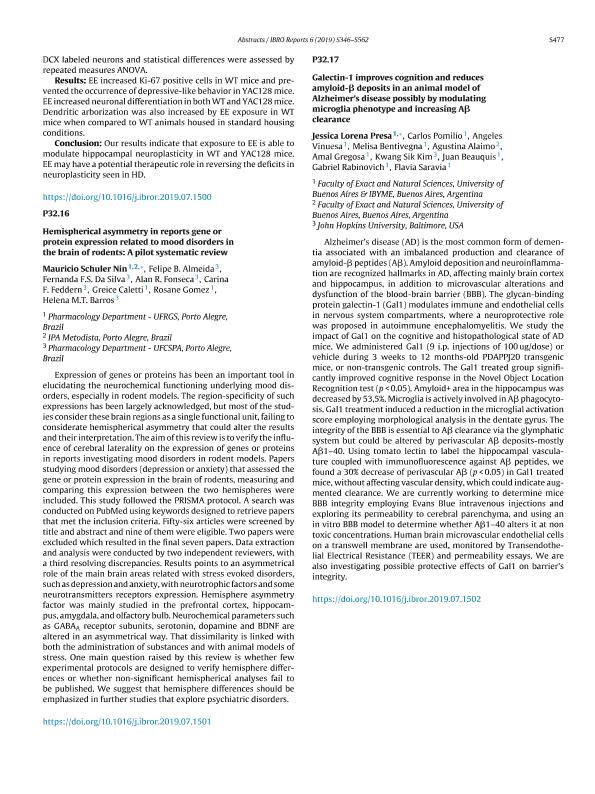Evento
Galectin-1 improves cognition and reduces amyloid-β deposits in an animal model of Alzheimer's disease possibly by modulating microglia phenotype and increasing Aβ clearance
Presa, Jessica Lorena; Pomilio, Carlos Javier ; Vinuesa, María Angeles
; Vinuesa, María Angeles ; Bentivegna, Melisa Inés María
; Bentivegna, Melisa Inés María ; Alaimo, Agustina
; Alaimo, Agustina ; Gregosa Merlino, Amal Patricio
; Gregosa Merlino, Amal Patricio ; Beauquis, Juan
; Beauquis, Juan ; Kwang, Sik Kim; Rabinovich, Gabriel Adrián
; Kwang, Sik Kim; Rabinovich, Gabriel Adrián ; Saravia, Flavia Eugenia
; Saravia, Flavia Eugenia
 ; Vinuesa, María Angeles
; Vinuesa, María Angeles ; Bentivegna, Melisa Inés María
; Bentivegna, Melisa Inés María ; Alaimo, Agustina
; Alaimo, Agustina ; Gregosa Merlino, Amal Patricio
; Gregosa Merlino, Amal Patricio ; Beauquis, Juan
; Beauquis, Juan ; Kwang, Sik Kim; Rabinovich, Gabriel Adrián
; Kwang, Sik Kim; Rabinovich, Gabriel Adrián ; Saravia, Flavia Eugenia
; Saravia, Flavia Eugenia
Tipo del evento:
Congreso
Nombre del evento:
The 10th International Brain Research Organization (IBRO) World Congress of Neuroscience
Fecha del evento:
21/09/2019
Institución Organizadora:
International Brain Research Organization;
Korea Brain Research Institute;
The Korean Society for Brain and Neural Sciences;
Título de la revista:
IBRO Reports
Editorial:
Elsevier
ISSN:
2451-8301
Idioma:
Inglés
Clasificación temática:
Resumen
Alzheimer's disease (AD) is the most common form of dementia associated with an imbalanced production and clearance of amyloid-β peptides (Aβ). Amyloid deposition and neuroinflammation are recognized hallmarks in AD, affecting mainly brain cortex and hippocampus, in addition to microvascular alterations and dysfunction of the blood-brain barrier (BBB). The glycan-binding protein galectin-1 (Gal1) modulates immune and endothelial cells in nervous system compartments, where a neuroprotective role was proposed in autoimmune encephalomyelitis. We study the impact of Gal1 on the cognitive and histopathological state of AD mice. We administered Gal1 (9 i.p. injections of 100 ug/dose) or vehicle during 3 weeks to 12 months-old PDAPPJ20 transgenic mice, or non-transgenic controls. The Gal1 treated group significantly improved cognitive response in the Novel Object Location Recognition test (p < 0.05). Amyloid+ area in the hippocampus was decreased by 53,5%. Microglia is actively involved in Aβ phagocytosis. Gal1 treatment induced a reduction in the microglial activation score employing morphological analysis in the dentate gyrus. The integrity of the BBB is essential to Aβ clearance via the glymphatic system but could be altered by perivascular Aβ deposits-mostly Aβ1–40. Using tomato lectin to label the hippocampal vasculature coupled with immunofluorescence against Aβ peptides, we found a 30% decrease of perivascular Aβ (p < 0.05) in Gal1 treated mice, without affecting vascular density, which could indicate augmented clearance. We are currently working to determine mice BBB integrity employing Evans Blue intravenous injections and exploring its permeability to cerebral parenchyma, and using an in vitro BBB model to determine whether Aβ1–40 alters it at non toxic concentrations. Human brain microvascular endothelial cells on a transwell membrane are used, monitored by Transendothelial Electrical Resistance (TEER) and permeability essays. We are also investigating possible protective effects of Gal1 on barrier's integrity.
Palabras clave:
Alzheimer
,
Blood-brain-barrier
,
Microglia
,
Galectin-1
Archivos asociados
Licencia
Identificadores
Colecciones
Eventos(IBYME)
Eventos de INST.DE BIOLOGIA Y MEDICINA EXPERIMENTAL (I)
Eventos de INST.DE BIOLOGIA Y MEDICINA EXPERIMENTAL (I)
Eventos(IQUIBICEN)
Eventos de INSTITUTO DE QUIMICA BIOLOGICA DE LA FACULTAD DE CS. EXACTAS Y NATURALES
Eventos de INSTITUTO DE QUIMICA BIOLOGICA DE LA FACULTAD DE CS. EXACTAS Y NATURALES
Citación
Galectin-1 improves cognition and reduces amyloid-β deposits in an animal model of Alzheimer's disease possibly by modulating microglia phenotype and increasing Aβ clearance; The 10th International Brain Research Organization (IBRO) World Congress of Neuroscience; Daegu; Corea del Sur; 2019; S477-S477
Compartir
Altmétricas



